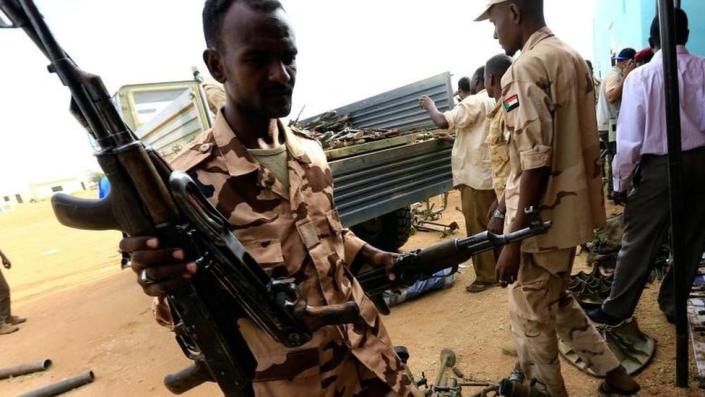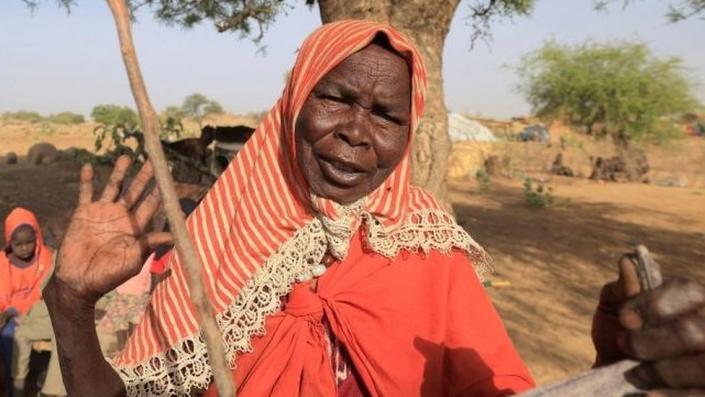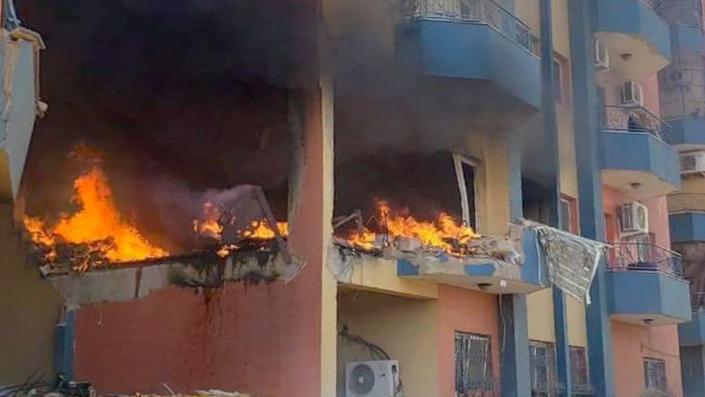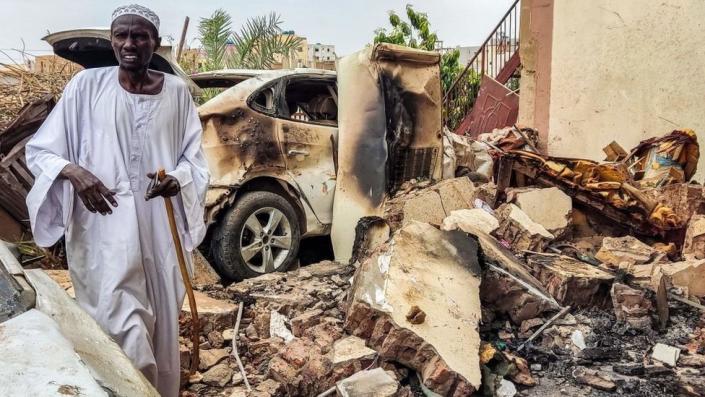
In a clear sign of their seriousness in ending the escalating conflict in Sudan, four East African states, led by Kenya, are pushing for the deployment of a regional force to protect civilians and ensure that that humanitarian aid reaches millions of people trapped in the war zone. .
But getting the warring factions to agree will be a difficult decision, as they have shown no interest in anything other than military victory since the conflict erupted in mid-April.
The army, led by General Abdel Fattah al-Burhan, controls most of eastern and central Sudan and is fighting to retain its bases in the capital, Khartoum.
The rival Rapid Support Forces (RSF), led by General Mohamed Hamdan Dagolo, known as “Hemedti”, has made advances in Khartoum, where its fighters have been accused of murder, rape and the occupation and looting of hospitals.
The army relentlessly bombarded RSF positions in the capital, apparently causing numerous civilian casualties.
On the media horizon, terrifying violence rages in Sudan’s Western Darfur region.
The RSF overran most of the region. Along with their allied Arab militias, RSF fighters have driven several thousand Masalit from their historic homeland in West Darfur.
They burned the palace of the sultan, customary leader of the group. When the governor, Khamis Abbakar, called it “genocide”, men in RSF uniforms abducted and killed him.
More than 160,000 Masalit refugees have crossed the border into Chad.
The RSF also ransacked the town of Zalingei, home to the Fur community, and surrounded the two largest towns in the region, al-Fashir and Nyala.
Many Darfurians fear it is the culmination of a long-standing plan to turn the ethnically mixed region into an Arab-ruled domain.

The urgent need in West Darfur is the protection of civilians. Ironically, the United Nations-African Union Mission in Darfur had exactly that mandate. But he was withdrawn two years ago in a decision that now looks horribly wrong.
RSF forces also besiege the capital of North Kordofan state, El-Obeid.
If they capture him, the military will only survive in the pockets west of the Nile.
In Southern Kordofan, a rebel group, the Sudan People’s Liberation Movement-North, which has been waging its own insurgency for 12 years, has advanced towards the state capital, Kadugli, as the army finds itself overwhelmed by the RSF.
Suddenly, there is a flurry of diplomatic activity. But there is no agreement on who should be in the lead.
Since the second week of the conflict, the United States and Saudi Arabia have convened ceasefire talks in the Saudi city of Jeddah.
But hopes for a cessation of hostilities – the most recent during the Eid al-Adha holiday – have come and gone without a slowing in the pace of violence.
The United States and Saudi Arabia announce that they will present a new proposal in the coming days. They have also made efforts to board the United Arab Emirates (UAE), which is important as the UAE is seen as the main support of the RSF and, according to some reports, continues to arm them. The United Arab Emirates did not comment on the reports.
A little over a month ago, unimpressed by the weak energy of the African Union (AU) to respond to the crisis, East African leaders launched their own initiative under the auspices of the regional body Igad.
A quartet – made up of the leaders of Kenya, Ethiopia, South Sudan and Djibouti – has been appointed to seek a ceasefire, humanitarian access and political dialogue to restore Sudan’s transition to democracy.

Kenyan President William Ruto – who leads the group – was candid, describing the war as “senseless”, condemning the two warring sides for using their military power “to destroy the country and kill civilians”, and warning that he there are “already signs of genocide” in Darfur.
It is this group of leaders, meeting Monday in Addis Ababa, the Ethiopian capital, which took the first steps towards the organization of a regional intervention force.
Their second lead is to work with the Americans and the Saudis to call a face-to-face meeting between the warring generals – Burhan and Hemedti – to secure a ceasefire.
Track three is an “inclusive policy process” due to begin in August. This requires bringing together civilian representatives and giving them sufficient political support to have real influence in the talks, as part of efforts to ensure that Sudan returns to the path of democracy.
But General Burhan rejected the initiative, saying Mr Ruto was biased towards the RSF. He also accuses the leaders of some of the civilian parties of siding with General Hemedti – they counter that General Burhan mobilized Islamist groups on his side. He first agreed, then declined, to attend Monday’s meeting. A delegate from the RSF was present.
The army claims the legacy and legitimacy of the government, although it seized power in a coup with the RSF in 2019, before their leaders fell, sparking civil war.
The military certainly has a stronger claim to government than the RSF, which is a paramilitary group run by the Dagolo family, earning money from its gold mines, mercenary activities and business empire.
He showed no interest in governing and allied himself with Arab supremacists in Darfur and neighboring countries.
General Burhan’s handicap is that his forces cannot protect either the state or the people. In fact, they don’t even control capital, the usual minimum threshold to be accepted as a legitimate government in Africa.
The United States initially did not signal support for Ruto’s initiative, preferring to stick with the AU. But he came to engage with what is to this day the highest level African intervention.
The Sudanese conflict is already destabilizing South Sudan. General Hemedti demanded that South Sudan stop paying the Sudanese government – i.e. General Burhan – for the use of the pipeline to Port Sudan, the only export route for the main source income from this country. South Sudan has yet to comment on the request.
Over the weekend, Mr. Ruto traveled to Chad to meet with President Mahamat Déby. Deeply frightened by the potential of the Darfur crisis to destabilize his country, Mr. Déby held a crisis meeting with Darfurian leaders, including commanders of former rebel groups, to discuss how best to respond.
Egypt already hosts more than 250,000 newly arrived refugees from Sudan. She fears that the ongoing destruction of Khartoum will lead to the inexorable exodus of the country’s entire middle class – Egyptians speak of two million and even more.
President Abdul Fattah al-Sisi has announced a joint initiative with Qatar and is calling his own summit meeting this week.
Egypt’s sympathies are openly with General Burhan, which helps explain why he is delaying the Igad plan. Mr Sisi sees General Burhan as his most trusted ally in Sudan and is prepared to tolerate a return of Sudanese Islamist groups – which have the support of Qatar and Turkey – if it means stabilizing the country.
But some diplomatic circles fear that the rival African and Arab peace processes could cancel each other out.

The UN has been sidelined. Its special representative for Sudan, Volker Perthes, was chosen for his technical skills in supporting institution-building during the now aborted transition to democracy, rather than his experience in mediating brutal conflict.
Moreover, General Burhan declared him persona non grata. Most Sudanese are appalled by the UN’s failures in Sudan and do not want to see it lead a diplomatic effort.
Likewise, Sudanese fear that the European Union’s obsessive focus on migration means they will deal with any leader who promises to stem the mass exodus.
Some Sudanese blame the EU for backing the RSF in the past as part of a plan to control the country’s borders – a claim the EU disputes.
The challenge of peace in Sudan is immense. The African leaders’ plan is the boldest and most comprehensive yet, but there are still many obstacles in the way of peace, including the warring parties’ refusal to accept that there is no solution. military in the conflict.
Alex de Waal is the Executive Director of the World Peace Foundation at the Fletcher School of Law and Diplomacy at Tufts University in the United States.

